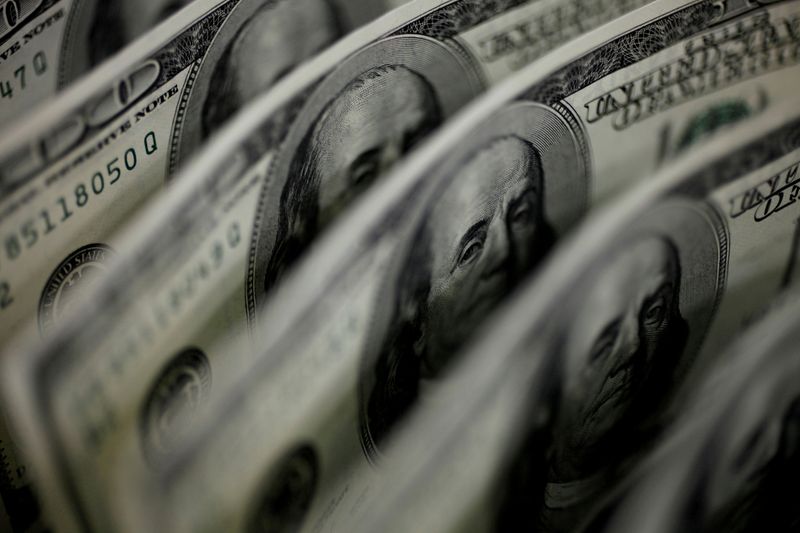By Sinéad Carew
NEW YORK (Reuters) - The dollar dipped on Monday after hitting 15-month highs on Friday following strong U.S. jobs data while investors digested the report, looked ahead to inflation data and monitored commentary from Federal Reserve officials for rate policy clues.
On Wednesday the Fed had stuck to its view that current high inflation is expected to be transitory and said it would start trimming its massive bond-buying program this month, but wait for more job growth before raising interest rates.
Then on Friday, U.S. data showed employment increased more than expected in October as the headwind from the surge in COVID-19 infections over the summer subsided, showing economic activity regaining momentum early in the fourth quarter.
U.S. Federal Reserve officials on Monday turned their focus toward interest rate policy with Fed Vice Chair Richard Clarida saying conditions for a rate hike could be met next year with job growth expected to continue and inflation already pushing beyond comfortable levels.
In separate remarks St. Louis Federal Reserve Bank President James Bullard repeated his view the Fed needs to raise rates twice next year.
The next test of the Fed's wait-and-see approach to inflation will be U.S. CPI data due on Wednesday.
"The focus this week is on inflation, which is why we'll probably be trading rangebound until we get those figures which could shed some light on interest rate hike timing," said Edward Moya, senior market analyst at OANDA in New York.
At 1521 EST (2021 GMT), the dollar index was down 0.19% on the day at 94.046, taking a breather after Friday's rally.
"Markets are digesting the information that we received last week, both from the Fed statement and also from the nonfarm (payrolls) report on Friday, which still point to the fact that the Fed is removing liquidity and expected to hike rates later next year," said Bipan Rai, North America head of FX Strategy at CIBC Capital Markets.
Commodity Futures Trading Commission data showed speculators scaled back their net long position on the dollar for the fourth week running in the week to Nov. 2.
The Australian dollar, which is seen as a proxy for risk appetite, was up 0.28% on the day.
The New Zealand dollar was 0.58% higher after Prime Minister Jacinda Arden announced that lockdown measures will likely be phased out by the end of the month.
The euro was a touch higher, up 0.17% at $1.1588.
Euro zone inflation will ease next year and remains too weak in the medium term, European Central Bank chief economist Philip Lane told a Spanish newspaper, repeating the bank's long-standing message that high price growth is temporary.

Britain's pound was up 0.54% at $1.3561, on the rebound from the five-week low it hit last week after the Bank of England meeting.
In cryptocurrencies, bitcoin was up 4% at around $65,936.62 - not far from its recent record high - while ether was up 3% at $3,093.48 after hitting a record high of $4,768.07 earlier.